Accounting Theory and Current Issues: Managerial Accounting Report
VerifiedAdded on 2022/11/29
|12
|3744
|88
Report
AI Summary
This report on accounting theory and current issues explores the significance of timing and recognition of events on income, revenue, profit, and expenses, particularly from a managerial perspective. It delves into earnings management practices, revenue recognition principles, and the matching concept, highlighting their impact on financial statements. The report examines positive accounting theory, discussing how managers may manipulate accounting policies to their advantage, such as through bonus plans. It also explores the motivations behind inflating reported profits, including incentives like bonuses and meeting investor expectations. The analysis underscores the importance of accurate and timely financial reporting for stakeholders and the potential for manipulation within the accounting framework. The report emphasizes the effects of accrual accounting and its impact on the financial results of the business, including the importance of consistency in profits. It also highlights the issues of manipulation of financial statements and its effects on the stakeholders. This report is a valuable resource for students seeking to understand the intricacies of accounting theory and its practical implications.
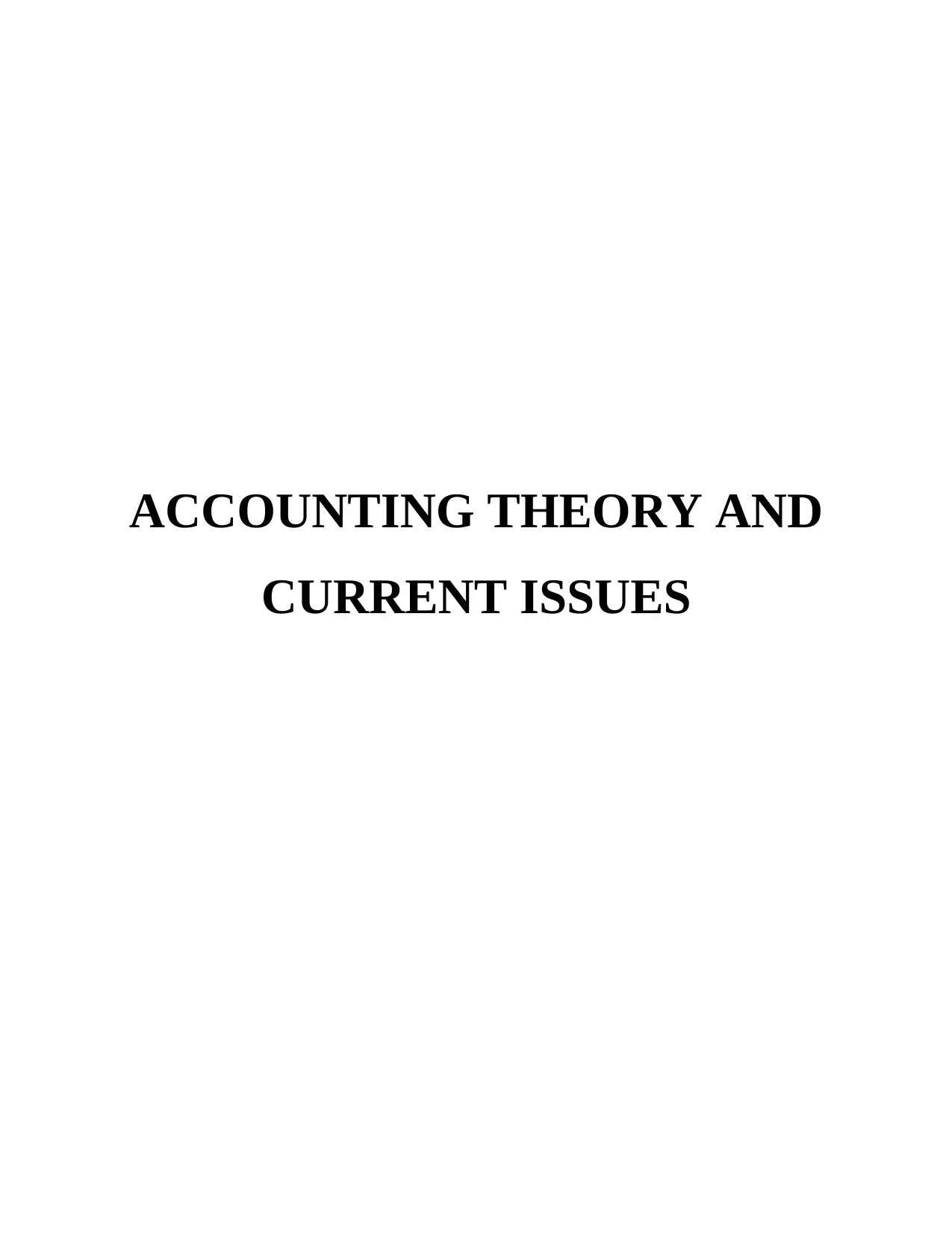
ACCOUNTING THEORY AND
CURRENT ISSUES
CURRENT ISSUES
Paraphrase This Document
Need a fresh take? Get an instant paraphrase of this document with our AI Paraphraser
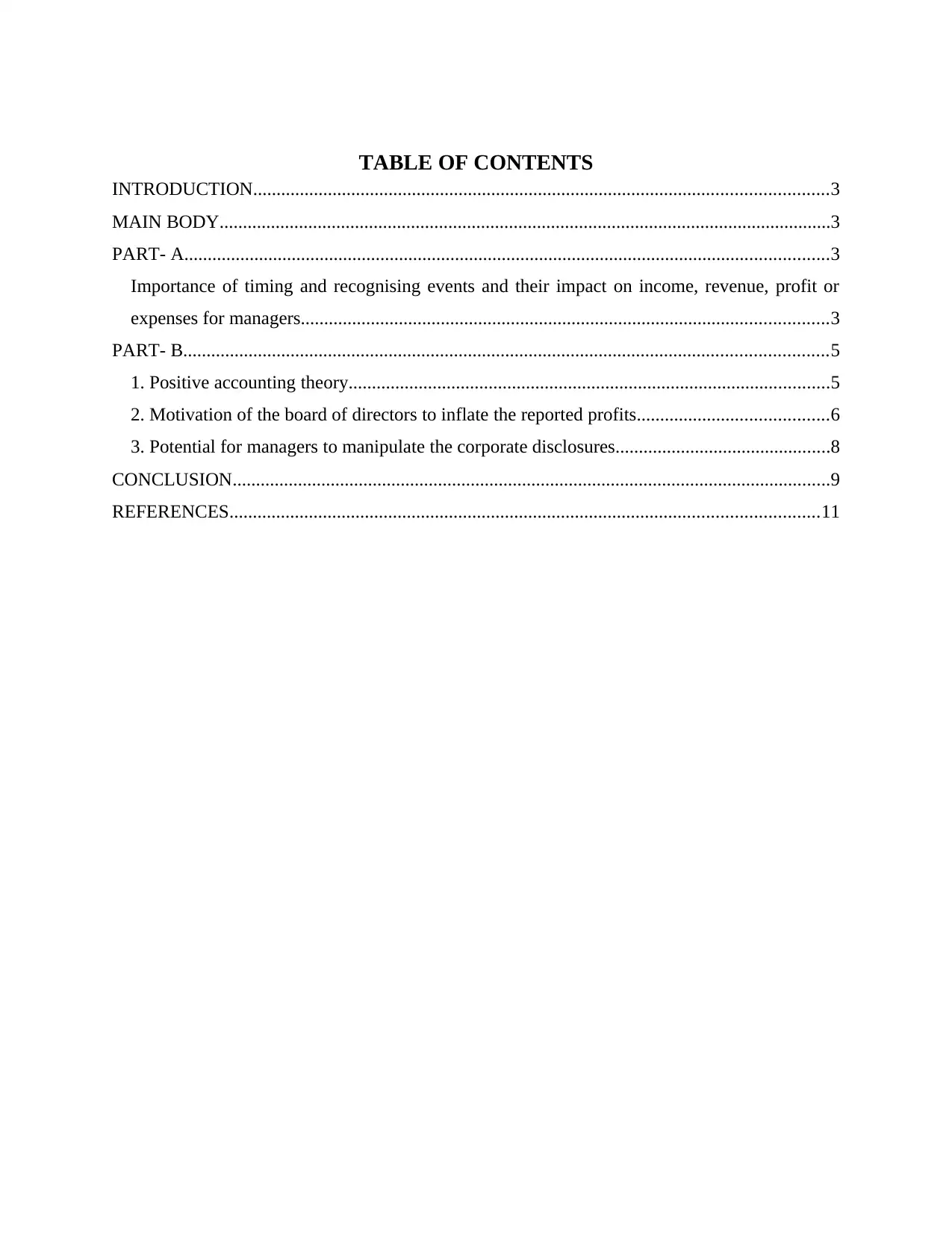
TABLE OF CONTENTS
INTRODUCTION...........................................................................................................................3
MAIN BODY...................................................................................................................................3
PART- A..........................................................................................................................................3
Importance of timing and recognising events and their impact on income, revenue, profit or
expenses for managers.................................................................................................................3
PART- B..........................................................................................................................................5
1. Positive accounting theory.......................................................................................................5
2. Motivation of the board of directors to inflate the reported profits.........................................6
3. Potential for managers to manipulate the corporate disclosures..............................................8
CONCLUSION................................................................................................................................9
REFERENCES..............................................................................................................................11
INTRODUCTION...........................................................................................................................3
MAIN BODY...................................................................................................................................3
PART- A..........................................................................................................................................3
Importance of timing and recognising events and their impact on income, revenue, profit or
expenses for managers.................................................................................................................3
PART- B..........................................................................................................................................5
1. Positive accounting theory.......................................................................................................5
2. Motivation of the board of directors to inflate the reported profits.........................................6
3. Potential for managers to manipulate the corporate disclosures..............................................8
CONCLUSION................................................................................................................................9
REFERENCES..............................................................................................................................11
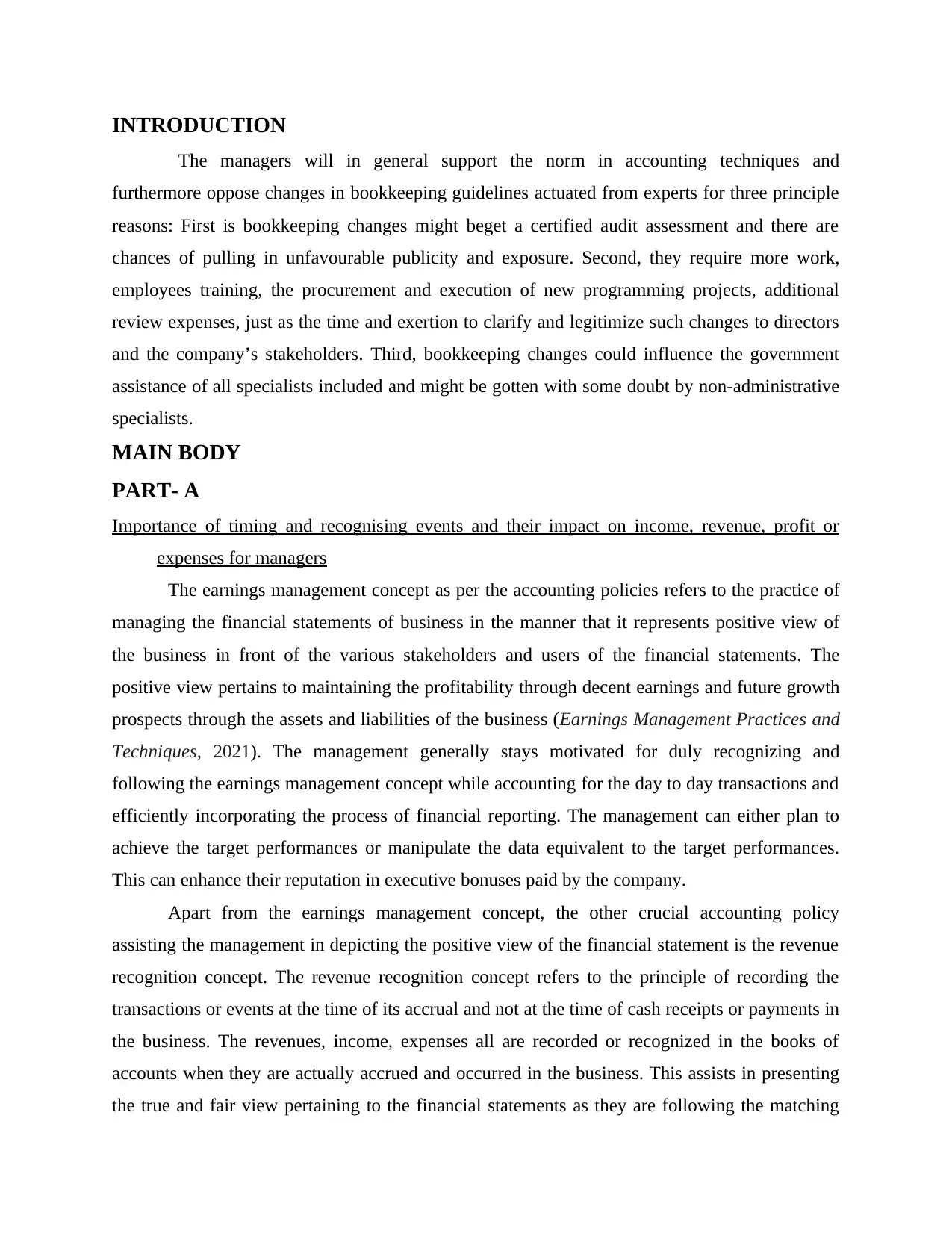
INTRODUCTION
The managers will in general support the norm in accounting techniques and
furthermore oppose changes in bookkeeping guidelines actuated from experts for three principle
reasons: First is bookkeeping changes might beget a certified audit assessment and there are
chances of pulling in unfavourable publicity and exposure. Second, they require more work,
employees training, the procurement and execution of new programming projects, additional
review expenses, just as the time and exertion to clarify and legitimize such changes to directors
and the company’s stakeholders. Third, bookkeeping changes could influence the government
assistance of all specialists included and might be gotten with some doubt by non-administrative
specialists.
MAIN BODY
PART- A
Importance of timing and recognising events and their impact on income, revenue, profit or
expenses for managers
The earnings management concept as per the accounting policies refers to the practice of
managing the financial statements of business in the manner that it represents positive view of
the business in front of the various stakeholders and users of the financial statements. The
positive view pertains to maintaining the profitability through decent earnings and future growth
prospects through the assets and liabilities of the business (Earnings Management Practices and
Techniques, 2021). The management generally stays motivated for duly recognizing and
following the earnings management concept while accounting for the day to day transactions and
efficiently incorporating the process of financial reporting. The management can either plan to
achieve the target performances or manipulate the data equivalent to the target performances.
This can enhance their reputation in executive bonuses paid by the company.
Apart from the earnings management concept, the other crucial accounting policy
assisting the management in depicting the positive view of the financial statement is the revenue
recognition concept. The revenue recognition concept refers to the principle of recording the
transactions or events at the time of its accrual and not at the time of cash receipts or payments in
the business. The revenues, income, expenses all are recorded or recognized in the books of
accounts when they are actually accrued and occurred in the business. This assists in presenting
the true and fair view pertaining to the financial statements as they are following the matching
The managers will in general support the norm in accounting techniques and
furthermore oppose changes in bookkeeping guidelines actuated from experts for three principle
reasons: First is bookkeeping changes might beget a certified audit assessment and there are
chances of pulling in unfavourable publicity and exposure. Second, they require more work,
employees training, the procurement and execution of new programming projects, additional
review expenses, just as the time and exertion to clarify and legitimize such changes to directors
and the company’s stakeholders. Third, bookkeeping changes could influence the government
assistance of all specialists included and might be gotten with some doubt by non-administrative
specialists.
MAIN BODY
PART- A
Importance of timing and recognising events and their impact on income, revenue, profit or
expenses for managers
The earnings management concept as per the accounting policies refers to the practice of
managing the financial statements of business in the manner that it represents positive view of
the business in front of the various stakeholders and users of the financial statements. The
positive view pertains to maintaining the profitability through decent earnings and future growth
prospects through the assets and liabilities of the business (Earnings Management Practices and
Techniques, 2021). The management generally stays motivated for duly recognizing and
following the earnings management concept while accounting for the day to day transactions and
efficiently incorporating the process of financial reporting. The management can either plan to
achieve the target performances or manipulate the data equivalent to the target performances.
This can enhance their reputation in executive bonuses paid by the company.
Apart from the earnings management concept, the other crucial accounting policy
assisting the management in depicting the positive view of the financial statement is the revenue
recognition concept. The revenue recognition concept refers to the principle of recording the
transactions or events at the time of its accrual and not at the time of cash receipts or payments in
the business. The revenues, income, expenses all are recorded or recognized in the books of
accounts when they are actually accrued and occurred in the business. This assists in presenting
the true and fair view pertaining to the financial statements as they are following the matching
⊘ This is a preview!⊘
Do you want full access?
Subscribe today to unlock all pages.

Trusted by 1+ million students worldwide
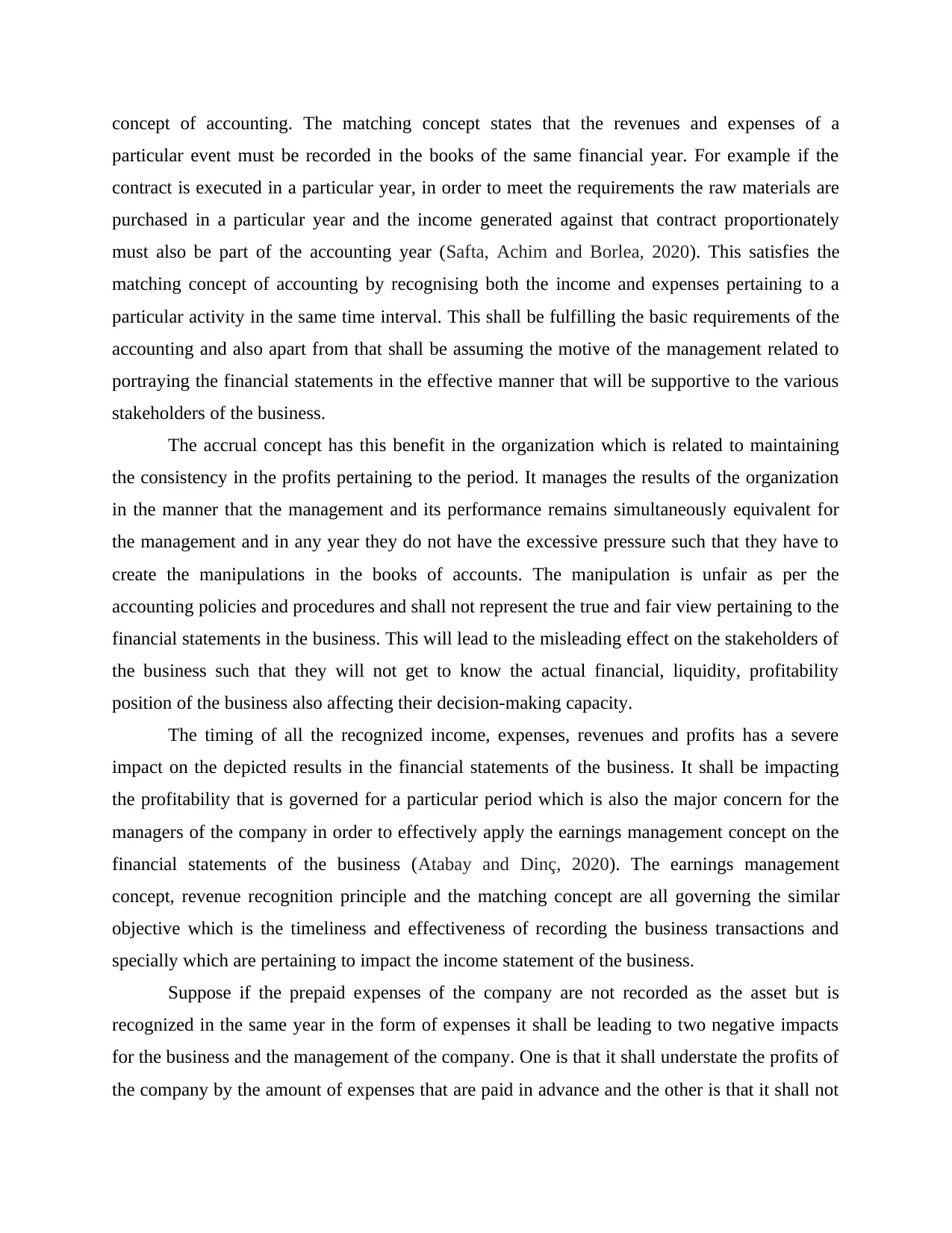
concept of accounting. The matching concept states that the revenues and expenses of a
particular event must be recorded in the books of the same financial year. For example if the
contract is executed in a particular year, in order to meet the requirements the raw materials are
purchased in a particular year and the income generated against that contract proportionately
must also be part of the accounting year (Safta, Achim and Borlea, 2020). This satisfies the
matching concept of accounting by recognising both the income and expenses pertaining to a
particular activity in the same time interval. This shall be fulfilling the basic requirements of the
accounting and also apart from that shall be assuming the motive of the management related to
portraying the financial statements in the effective manner that will be supportive to the various
stakeholders of the business.
The accrual concept has this benefit in the organization which is related to maintaining
the consistency in the profits pertaining to the period. It manages the results of the organization
in the manner that the management and its performance remains simultaneously equivalent for
the management and in any year they do not have the excessive pressure such that they have to
create the manipulations in the books of accounts. The manipulation is unfair as per the
accounting policies and procedures and shall not represent the true and fair view pertaining to the
financial statements in the business. This will lead to the misleading effect on the stakeholders of
the business such that they will not get to know the actual financial, liquidity, profitability
position of the business also affecting their decision-making capacity.
The timing of all the recognized income, expenses, revenues and profits has a severe
impact on the depicted results in the financial statements of the business. It shall be impacting
the profitability that is governed for a particular period which is also the major concern for the
managers of the company in order to effectively apply the earnings management concept on the
financial statements of the business (Atabay and Dinç, 2020). The earnings management
concept, revenue recognition principle and the matching concept are all governing the similar
objective which is the timeliness and effectiveness of recording the business transactions and
specially which are pertaining to impact the income statement of the business.
Suppose if the prepaid expenses of the company are not recorded as the asset but is
recognized in the same year in the form of expenses it shall be leading to two negative impacts
for the business and the management of the company. One is that it shall understate the profits of
the company by the amount of expenses that are paid in advance and the other is that it shall not
particular event must be recorded in the books of the same financial year. For example if the
contract is executed in a particular year, in order to meet the requirements the raw materials are
purchased in a particular year and the income generated against that contract proportionately
must also be part of the accounting year (Safta, Achim and Borlea, 2020). This satisfies the
matching concept of accounting by recognising both the income and expenses pertaining to a
particular activity in the same time interval. This shall be fulfilling the basic requirements of the
accounting and also apart from that shall be assuming the motive of the management related to
portraying the financial statements in the effective manner that will be supportive to the various
stakeholders of the business.
The accrual concept has this benefit in the organization which is related to maintaining
the consistency in the profits pertaining to the period. It manages the results of the organization
in the manner that the management and its performance remains simultaneously equivalent for
the management and in any year they do not have the excessive pressure such that they have to
create the manipulations in the books of accounts. The manipulation is unfair as per the
accounting policies and procedures and shall not represent the true and fair view pertaining to the
financial statements in the business. This will lead to the misleading effect on the stakeholders of
the business such that they will not get to know the actual financial, liquidity, profitability
position of the business also affecting their decision-making capacity.
The timing of all the recognized income, expenses, revenues and profits has a severe
impact on the depicted results in the financial statements of the business. It shall be impacting
the profitability that is governed for a particular period which is also the major concern for the
managers of the company in order to effectively apply the earnings management concept on the
financial statements of the business (Atabay and Dinç, 2020). The earnings management
concept, revenue recognition principle and the matching concept are all governing the similar
objective which is the timeliness and effectiveness of recording the business transactions and
specially which are pertaining to impact the income statement of the business.
Suppose if the prepaid expenses of the company are not recorded as the asset but is
recognized in the same year in the form of expenses it shall be leading to two negative impacts
for the business and the management of the company. One is that it shall understate the profits of
the company by the amount of expenses that are paid in advance and the other is that it shall not
Paraphrase This Document
Need a fresh take? Get an instant paraphrase of this document with our AI Paraphraser
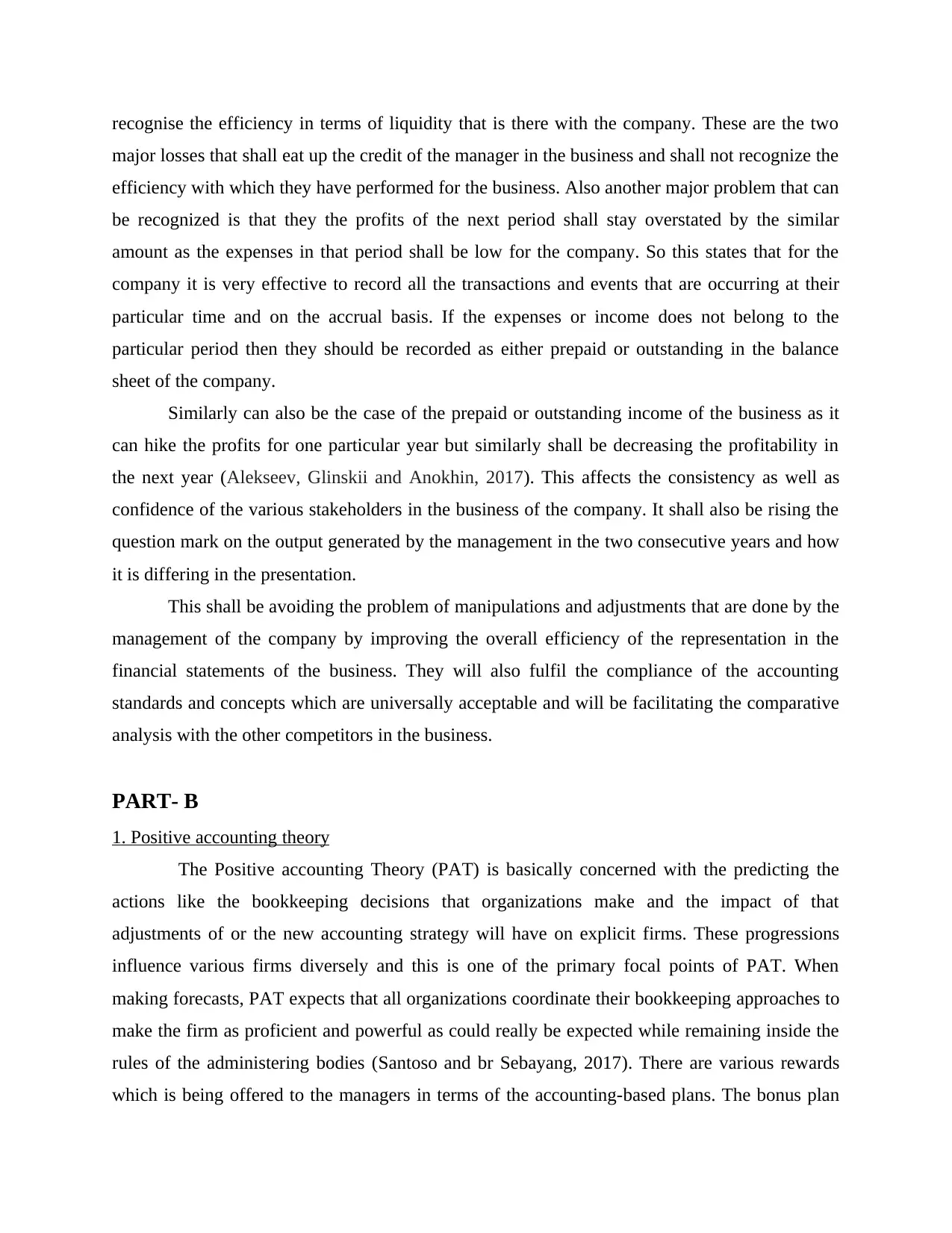
recognise the efficiency in terms of liquidity that is there with the company. These are the two
major losses that shall eat up the credit of the manager in the business and shall not recognize the
efficiency with which they have performed for the business. Also another major problem that can
be recognized is that they the profits of the next period shall stay overstated by the similar
amount as the expenses in that period shall be low for the company. So this states that for the
company it is very effective to record all the transactions and events that are occurring at their
particular time and on the accrual basis. If the expenses or income does not belong to the
particular period then they should be recorded as either prepaid or outstanding in the balance
sheet of the company.
Similarly can also be the case of the prepaid or outstanding income of the business as it
can hike the profits for one particular year but similarly shall be decreasing the profitability in
the next year (Alekseev, Glinskii and Anokhin, 2017). This affects the consistency as well as
confidence of the various stakeholders in the business of the company. It shall also be rising the
question mark on the output generated by the management in the two consecutive years and how
it is differing in the presentation.
This shall be avoiding the problem of manipulations and adjustments that are done by the
management of the company by improving the overall efficiency of the representation in the
financial statements of the business. They will also fulfil the compliance of the accounting
standards and concepts which are universally acceptable and will be facilitating the comparative
analysis with the other competitors in the business.
PART- B
1. Positive accounting theory
The Positive accounting Theory (PAT) is basically concerned with the predicting the
actions like the bookkeeping decisions that organizations make and the impact of that
adjustments of or the new accounting strategy will have on explicit firms. These progressions
influence various firms diversely and this is one of the primary focal points of PAT. When
making forecasts, PAT expects that all organizations coordinate their bookkeeping approaches to
make the firm as proficient and powerful as could really be expected while remaining inside the
rules of the administering bodies (Santoso and br Sebayang, 2017). There are various rewards
which is being offered to the managers in terms of the accounting-based plans. The bonus plan
major losses that shall eat up the credit of the manager in the business and shall not recognize the
efficiency with which they have performed for the business. Also another major problem that can
be recognized is that they the profits of the next period shall stay overstated by the similar
amount as the expenses in that period shall be low for the company. So this states that for the
company it is very effective to record all the transactions and events that are occurring at their
particular time and on the accrual basis. If the expenses or income does not belong to the
particular period then they should be recorded as either prepaid or outstanding in the balance
sheet of the company.
Similarly can also be the case of the prepaid or outstanding income of the business as it
can hike the profits for one particular year but similarly shall be decreasing the profitability in
the next year (Alekseev, Glinskii and Anokhin, 2017). This affects the consistency as well as
confidence of the various stakeholders in the business of the company. It shall also be rising the
question mark on the output generated by the management in the two consecutive years and how
it is differing in the presentation.
This shall be avoiding the problem of manipulations and adjustments that are done by the
management of the company by improving the overall efficiency of the representation in the
financial statements of the business. They will also fulfil the compliance of the accounting
standards and concepts which are universally acceptable and will be facilitating the comparative
analysis with the other competitors in the business.
PART- B
1. Positive accounting theory
The Positive accounting Theory (PAT) is basically concerned with the predicting the
actions like the bookkeeping decisions that organizations make and the impact of that
adjustments of or the new accounting strategy will have on explicit firms. These progressions
influence various firms diversely and this is one of the primary focal points of PAT. When
making forecasts, PAT expects that all organizations coordinate their bookkeeping approaches to
make the firm as proficient and powerful as could really be expected while remaining inside the
rules of the administering bodies (Santoso and br Sebayang, 2017). There are various rewards
which is being offered to the managers in terms of the accounting-based plans. The bonus plan
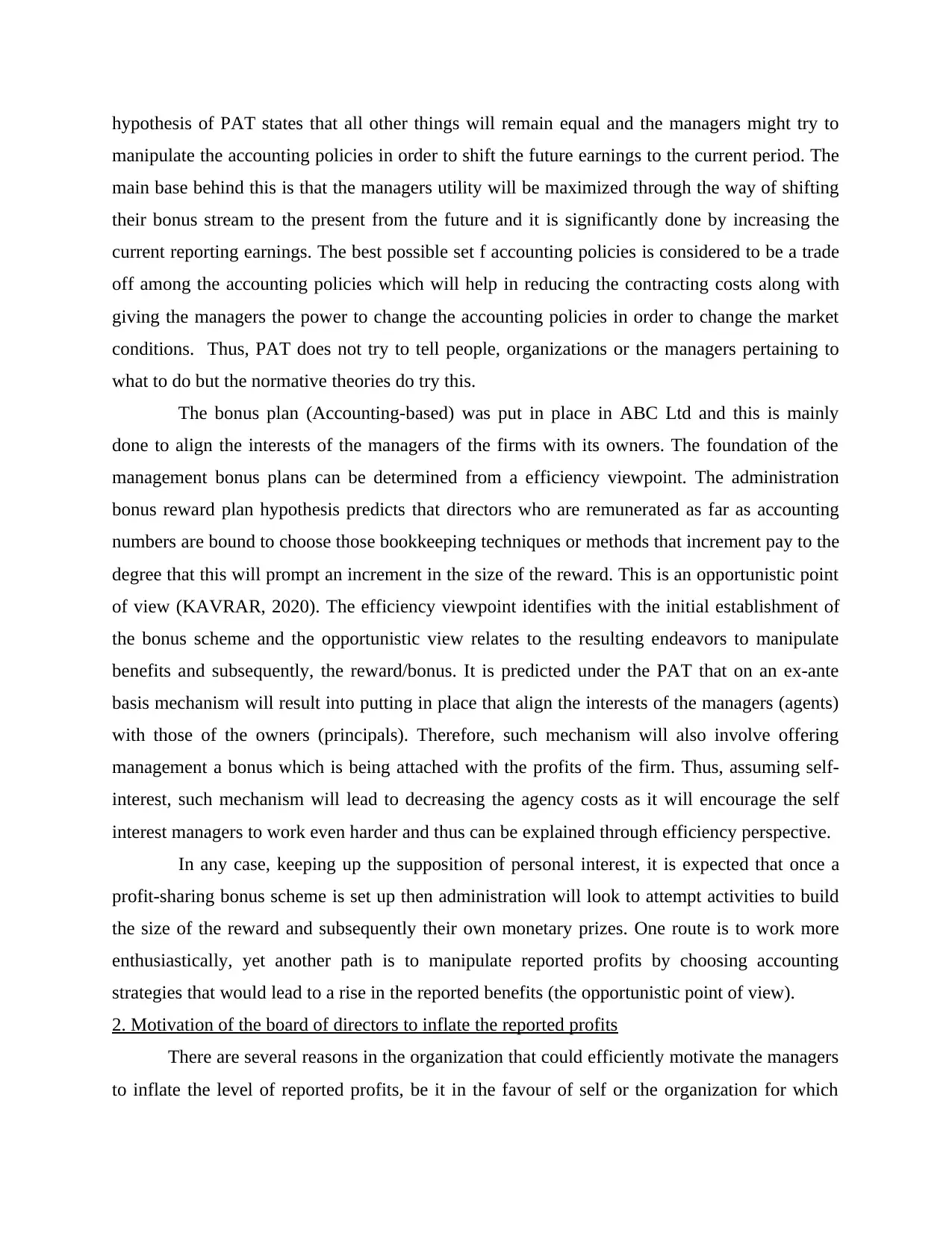
hypothesis of PAT states that all other things will remain equal and the managers might try to
manipulate the accounting policies in order to shift the future earnings to the current period. The
main base behind this is that the managers utility will be maximized through the way of shifting
their bonus stream to the present from the future and it is significantly done by increasing the
current reporting earnings. The best possible set f accounting policies is considered to be a trade
off among the accounting policies which will help in reducing the contracting costs along with
giving the managers the power to change the accounting policies in order to change the market
conditions. Thus, PAT does not try to tell people, organizations or the managers pertaining to
what to do but the normative theories do try this.
The bonus plan (Accounting-based) was put in place in ABC Ltd and this is mainly
done to align the interests of the managers of the firms with its owners. The foundation of the
management bonus plans can be determined from a efficiency viewpoint. The administration
bonus reward plan hypothesis predicts that directors who are remunerated as far as accounting
numbers are bound to choose those bookkeeping techniques or methods that increment pay to the
degree that this will prompt an increment in the size of the reward. This is an opportunistic point
of view (KAVRAR, 2020). The efficiency viewpoint identifies with the initial establishment of
the bonus scheme and the opportunistic view relates to the resulting endeavors to manipulate
benefits and subsequently, the reward/bonus. It is predicted under the PAT that on an ex-ante
basis mechanism will result into putting in place that align the interests of the managers (agents)
with those of the owners (principals). Therefore, such mechanism will also involve offering
management a bonus which is being attached with the profits of the firm. Thus, assuming self-
interest, such mechanism will lead to decreasing the agency costs as it will encourage the self
interest managers to work even harder and thus can be explained through efficiency perspective.
In any case, keeping up the supposition of personal interest, it is expected that once a
profit-sharing bonus scheme is set up then administration will look to attempt activities to build
the size of the reward and subsequently their own monetary prizes. One route is to work more
enthusiastically, yet another path is to manipulate reported profits by choosing accounting
strategies that would lead to a rise in the reported benefits (the opportunistic point of view).
2. Motivation of the board of directors to inflate the reported profits
There are several reasons in the organization that could efficiently motivate the managers
to inflate the level of reported profits, be it in the favour of self or the organization for which
manipulate the accounting policies in order to shift the future earnings to the current period. The
main base behind this is that the managers utility will be maximized through the way of shifting
their bonus stream to the present from the future and it is significantly done by increasing the
current reporting earnings. The best possible set f accounting policies is considered to be a trade
off among the accounting policies which will help in reducing the contracting costs along with
giving the managers the power to change the accounting policies in order to change the market
conditions. Thus, PAT does not try to tell people, organizations or the managers pertaining to
what to do but the normative theories do try this.
The bonus plan (Accounting-based) was put in place in ABC Ltd and this is mainly
done to align the interests of the managers of the firms with its owners. The foundation of the
management bonus plans can be determined from a efficiency viewpoint. The administration
bonus reward plan hypothesis predicts that directors who are remunerated as far as accounting
numbers are bound to choose those bookkeeping techniques or methods that increment pay to the
degree that this will prompt an increment in the size of the reward. This is an opportunistic point
of view (KAVRAR, 2020). The efficiency viewpoint identifies with the initial establishment of
the bonus scheme and the opportunistic view relates to the resulting endeavors to manipulate
benefits and subsequently, the reward/bonus. It is predicted under the PAT that on an ex-ante
basis mechanism will result into putting in place that align the interests of the managers (agents)
with those of the owners (principals). Therefore, such mechanism will also involve offering
management a bonus which is being attached with the profits of the firm. Thus, assuming self-
interest, such mechanism will lead to decreasing the agency costs as it will encourage the self
interest managers to work even harder and thus can be explained through efficiency perspective.
In any case, keeping up the supposition of personal interest, it is expected that once a
profit-sharing bonus scheme is set up then administration will look to attempt activities to build
the size of the reward and subsequently their own monetary prizes. One route is to work more
enthusiastically, yet another path is to manipulate reported profits by choosing accounting
strategies that would lead to a rise in the reported benefits (the opportunistic point of view).
2. Motivation of the board of directors to inflate the reported profits
There are several reasons in the organization that could efficiently motivate the managers
to inflate the level of reported profits, be it in the favour of self or the organization for which
⊘ This is a preview!⊘
Do you want full access?
Subscribe today to unlock all pages.

Trusted by 1+ million students worldwide
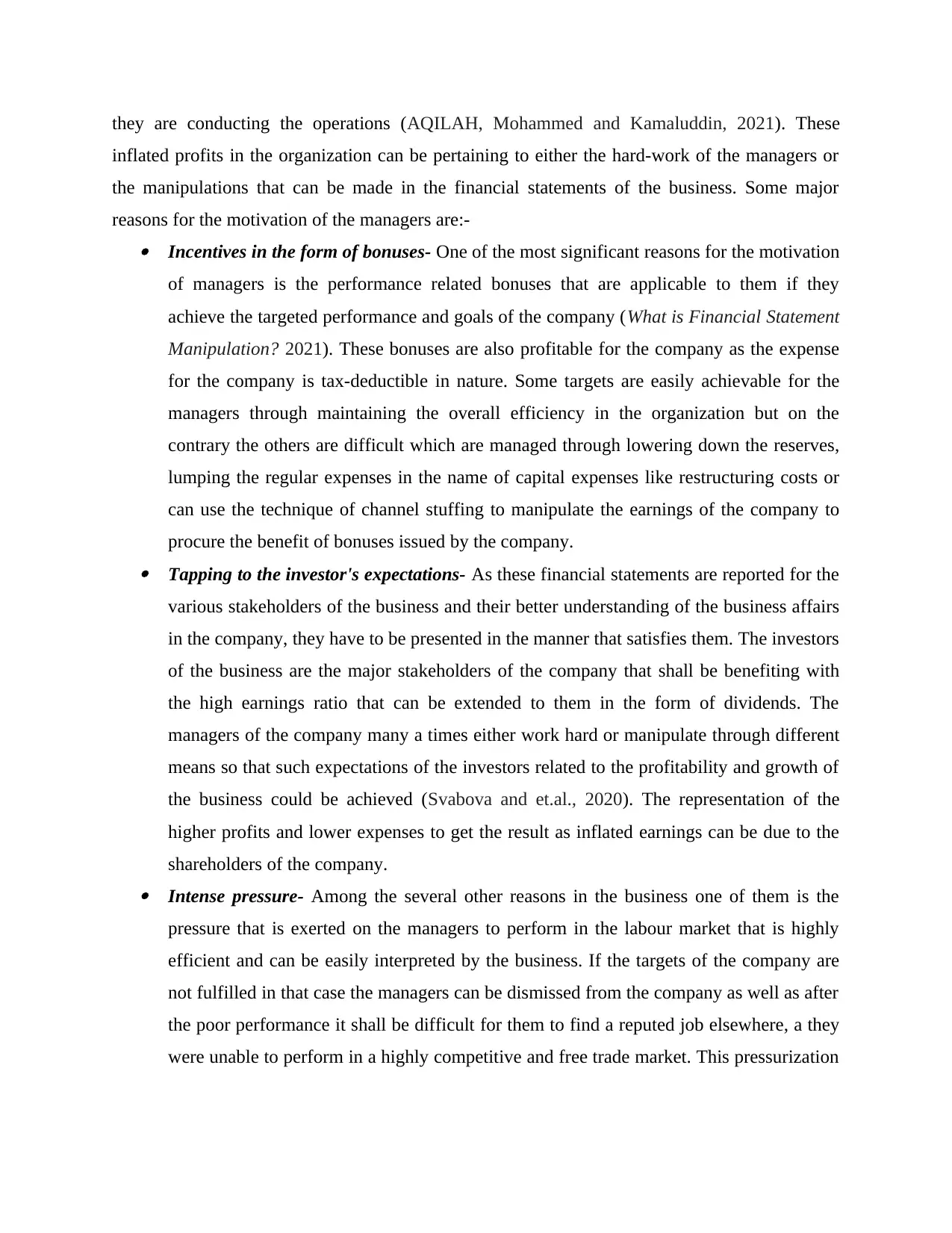
they are conducting the operations (AQILAH, Mohammed and Kamaluddin, 2021). These
inflated profits in the organization can be pertaining to either the hard-work of the managers or
the manipulations that can be made in the financial statements of the business. Some major
reasons for the motivation of the managers are:- Incentives in the form of bonuses- One of the most significant reasons for the motivation
of managers is the performance related bonuses that are applicable to them if they
achieve the targeted performance and goals of the company (What is Financial Statement
Manipulation? 2021). These bonuses are also profitable for the company as the expense
for the company is tax-deductible in nature. Some targets are easily achievable for the
managers through maintaining the overall efficiency in the organization but on the
contrary the others are difficult which are managed through lowering down the reserves,
lumping the regular expenses in the name of capital expenses like restructuring costs or
can use the technique of channel stuffing to manipulate the earnings of the company to
procure the benefit of bonuses issued by the company. Tapping to the investor's expectations- As these financial statements are reported for the
various stakeholders of the business and their better understanding of the business affairs
in the company, they have to be presented in the manner that satisfies them. The investors
of the business are the major stakeholders of the company that shall be benefiting with
the high earnings ratio that can be extended to them in the form of dividends. The
managers of the company many a times either work hard or manipulate through different
means so that such expectations of the investors related to the profitability and growth of
the business could be achieved (Svabova and et.al., 2020). The representation of the
higher profits and lower expenses to get the result as inflated earnings can be due to the
shareholders of the company. Intense pressure- Among the several other reasons in the business one of them is the
pressure that is exerted on the managers to perform in the labour market that is highly
efficient and can be easily interpreted by the business. If the targets of the company are
not fulfilled in that case the managers can be dismissed from the company as well as after
the poor performance it shall be difficult for them to find a reputed job elsewhere, a they
were unable to perform in a highly competitive and free trade market. This pressurization
inflated profits in the organization can be pertaining to either the hard-work of the managers or
the manipulations that can be made in the financial statements of the business. Some major
reasons for the motivation of the managers are:- Incentives in the form of bonuses- One of the most significant reasons for the motivation
of managers is the performance related bonuses that are applicable to them if they
achieve the targeted performance and goals of the company (What is Financial Statement
Manipulation? 2021). These bonuses are also profitable for the company as the expense
for the company is tax-deductible in nature. Some targets are easily achievable for the
managers through maintaining the overall efficiency in the organization but on the
contrary the others are difficult which are managed through lowering down the reserves,
lumping the regular expenses in the name of capital expenses like restructuring costs or
can use the technique of channel stuffing to manipulate the earnings of the company to
procure the benefit of bonuses issued by the company. Tapping to the investor's expectations- As these financial statements are reported for the
various stakeholders of the business and their better understanding of the business affairs
in the company, they have to be presented in the manner that satisfies them. The investors
of the business are the major stakeholders of the company that shall be benefiting with
the high earnings ratio that can be extended to them in the form of dividends. The
managers of the company many a times either work hard or manipulate through different
means so that such expectations of the investors related to the profitability and growth of
the business could be achieved (Svabova and et.al., 2020). The representation of the
higher profits and lower expenses to get the result as inflated earnings can be due to the
shareholders of the company. Intense pressure- Among the several other reasons in the business one of them is the
pressure that is exerted on the managers to perform in the labour market that is highly
efficient and can be easily interpreted by the business. If the targets of the company are
not fulfilled in that case the managers can be dismissed from the company as well as after
the poor performance it shall be difficult for them to find a reputed job elsewhere, a they
were unable to perform in a highly competitive and free trade market. This pressurization
Paraphrase This Document
Need a fresh take? Get an instant paraphrase of this document with our AI Paraphraser
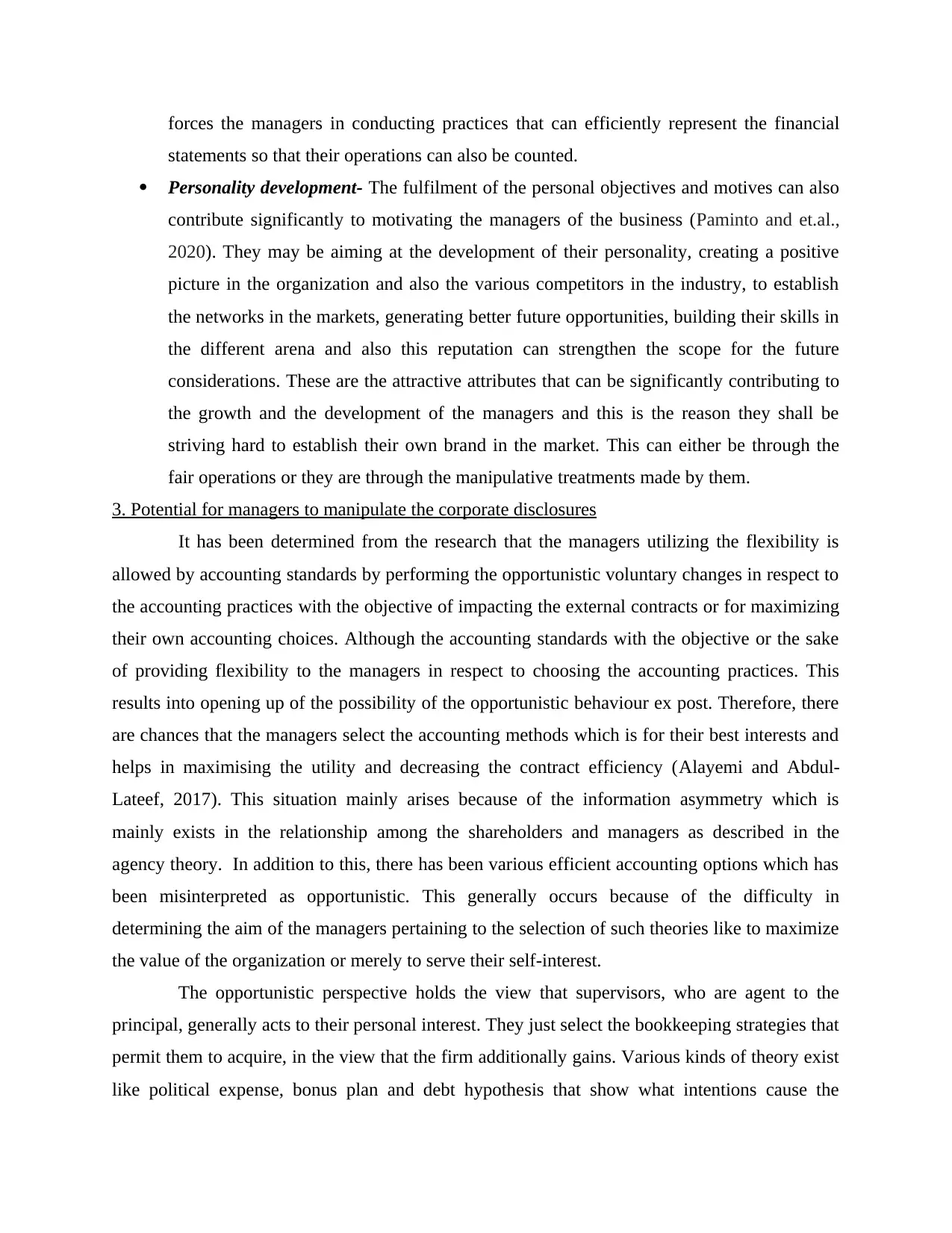
forces the managers in conducting practices that can efficiently represent the financial
statements so that their operations can also be counted.
Personality development- The fulfilment of the personal objectives and motives can also
contribute significantly to motivating the managers of the business (Paminto and et.al.,
2020). They may be aiming at the development of their personality, creating a positive
picture in the organization and also the various competitors in the industry, to establish
the networks in the markets, generating better future opportunities, building their skills in
the different arena and also this reputation can strengthen the scope for the future
considerations. These are the attractive attributes that can be significantly contributing to
the growth and the development of the managers and this is the reason they shall be
striving hard to establish their own brand in the market. This can either be through the
fair operations or they are through the manipulative treatments made by them.
3. Potential for managers to manipulate the corporate disclosures
It has been determined from the research that the managers utilizing the flexibility is
allowed by accounting standards by performing the opportunistic voluntary changes in respect to
the accounting practices with the objective of impacting the external contracts or for maximizing
their own accounting choices. Although the accounting standards with the objective or the sake
of providing flexibility to the managers in respect to choosing the accounting practices. This
results into opening up of the possibility of the opportunistic behaviour ex post. Therefore, there
are chances that the managers select the accounting methods which is for their best interests and
helps in maximising the utility and decreasing the contract efficiency (Alayemi and Abdul-
Lateef, 2017). This situation mainly arises because of the information asymmetry which is
mainly exists in the relationship among the shareholders and managers as described in the
agency theory. In addition to this, there has been various efficient accounting options which has
been misinterpreted as opportunistic. This generally occurs because of the difficulty in
determining the aim of the managers pertaining to the selection of such theories like to maximize
the value of the organization or merely to serve their self-interest.
The opportunistic perspective holds the view that supervisors, who are agent to the
principal, generally acts to their personal interest. They just select the bookkeeping strategies that
permit them to acquire, in the view that the firm additionally gains. Various kinds of theory exist
like political expense, bonus plan and debt hypothesis that show what intentions cause the
statements so that their operations can also be counted.
Personality development- The fulfilment of the personal objectives and motives can also
contribute significantly to motivating the managers of the business (Paminto and et.al.,
2020). They may be aiming at the development of their personality, creating a positive
picture in the organization and also the various competitors in the industry, to establish
the networks in the markets, generating better future opportunities, building their skills in
the different arena and also this reputation can strengthen the scope for the future
considerations. These are the attractive attributes that can be significantly contributing to
the growth and the development of the managers and this is the reason they shall be
striving hard to establish their own brand in the market. This can either be through the
fair operations or they are through the manipulative treatments made by them.
3. Potential for managers to manipulate the corporate disclosures
It has been determined from the research that the managers utilizing the flexibility is
allowed by accounting standards by performing the opportunistic voluntary changes in respect to
the accounting practices with the objective of impacting the external contracts or for maximizing
their own accounting choices. Although the accounting standards with the objective or the sake
of providing flexibility to the managers in respect to choosing the accounting practices. This
results into opening up of the possibility of the opportunistic behaviour ex post. Therefore, there
are chances that the managers select the accounting methods which is for their best interests and
helps in maximising the utility and decreasing the contract efficiency (Alayemi and Abdul-
Lateef, 2017). This situation mainly arises because of the information asymmetry which is
mainly exists in the relationship among the shareholders and managers as described in the
agency theory. In addition to this, there has been various efficient accounting options which has
been misinterpreted as opportunistic. This generally occurs because of the difficulty in
determining the aim of the managers pertaining to the selection of such theories like to maximize
the value of the organization or merely to serve their self-interest.
The opportunistic perspective holds the view that supervisors, who are agent to the
principal, generally acts to their personal interest. They just select the bookkeeping strategies that
permit them to acquire, in the view that the firm additionally gains. Various kinds of theory exist
like political expense, bonus plan and debt hypothesis that show what intentions cause the
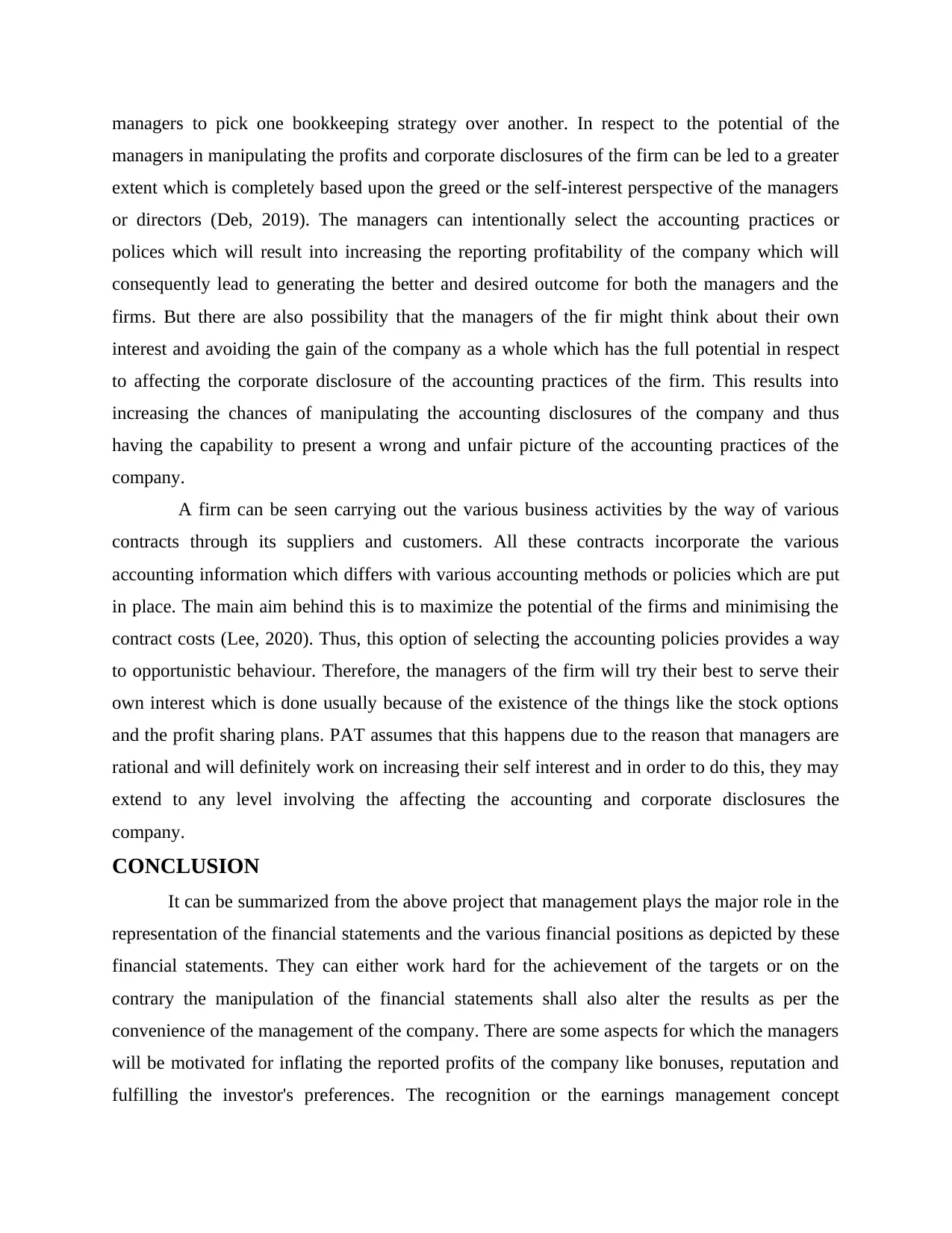
managers to pick one bookkeeping strategy over another. In respect to the potential of the
managers in manipulating the profits and corporate disclosures of the firm can be led to a greater
extent which is completely based upon the greed or the self-interest perspective of the managers
or directors (Deb, 2019). The managers can intentionally select the accounting practices or
polices which will result into increasing the reporting profitability of the company which will
consequently lead to generating the better and desired outcome for both the managers and the
firms. But there are also possibility that the managers of the fir might think about their own
interest and avoiding the gain of the company as a whole which has the full potential in respect
to affecting the corporate disclosure of the accounting practices of the firm. This results into
increasing the chances of manipulating the accounting disclosures of the company and thus
having the capability to present a wrong and unfair picture of the accounting practices of the
company.
A firm can be seen carrying out the various business activities by the way of various
contracts through its suppliers and customers. All these contracts incorporate the various
accounting information which differs with various accounting methods or policies which are put
in place. The main aim behind this is to maximize the potential of the firms and minimising the
contract costs (Lee, 2020). Thus, this option of selecting the accounting policies provides a way
to opportunistic behaviour. Therefore, the managers of the firm will try their best to serve their
own interest which is done usually because of the existence of the things like the stock options
and the profit sharing plans. PAT assumes that this happens due to the reason that managers are
rational and will definitely work on increasing their self interest and in order to do this, they may
extend to any level involving the affecting the accounting and corporate disclosures the
company.
CONCLUSION
It can be summarized from the above project that management plays the major role in the
representation of the financial statements and the various financial positions as depicted by these
financial statements. They can either work hard for the achievement of the targets or on the
contrary the manipulation of the financial statements shall also alter the results as per the
convenience of the management of the company. There are some aspects for which the managers
will be motivated for inflating the reported profits of the company like bonuses, reputation and
fulfilling the investor's preferences. The recognition or the earnings management concept
managers in manipulating the profits and corporate disclosures of the firm can be led to a greater
extent which is completely based upon the greed or the self-interest perspective of the managers
or directors (Deb, 2019). The managers can intentionally select the accounting practices or
polices which will result into increasing the reporting profitability of the company which will
consequently lead to generating the better and desired outcome for both the managers and the
firms. But there are also possibility that the managers of the fir might think about their own
interest and avoiding the gain of the company as a whole which has the full potential in respect
to affecting the corporate disclosure of the accounting practices of the firm. This results into
increasing the chances of manipulating the accounting disclosures of the company and thus
having the capability to present a wrong and unfair picture of the accounting practices of the
company.
A firm can be seen carrying out the various business activities by the way of various
contracts through its suppliers and customers. All these contracts incorporate the various
accounting information which differs with various accounting methods or policies which are put
in place. The main aim behind this is to maximize the potential of the firms and minimising the
contract costs (Lee, 2020). Thus, this option of selecting the accounting policies provides a way
to opportunistic behaviour. Therefore, the managers of the firm will try their best to serve their
own interest which is done usually because of the existence of the things like the stock options
and the profit sharing plans. PAT assumes that this happens due to the reason that managers are
rational and will definitely work on increasing their self interest and in order to do this, they may
extend to any level involving the affecting the accounting and corporate disclosures the
company.
CONCLUSION
It can be summarized from the above project that management plays the major role in the
representation of the financial statements and the various financial positions as depicted by these
financial statements. They can either work hard for the achievement of the targets or on the
contrary the manipulation of the financial statements shall also alter the results as per the
convenience of the management of the company. There are some aspects for which the managers
will be motivated for inflating the reported profits of the company like bonuses, reputation and
fulfilling the investor's preferences. The recognition or the earnings management concept
⊘ This is a preview!⊘
Do you want full access?
Subscribe today to unlock all pages.

Trusted by 1+ million students worldwide
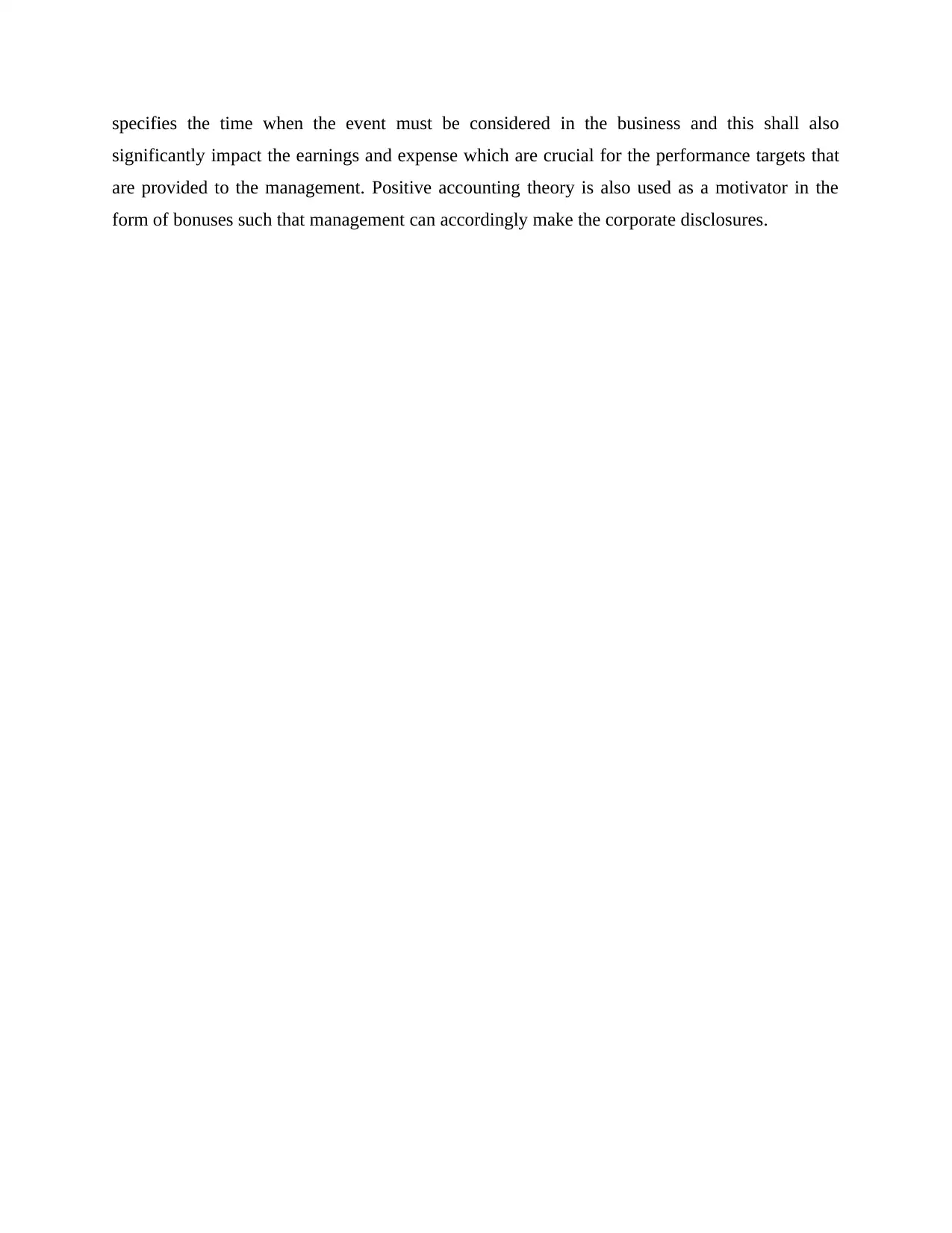
specifies the time when the event must be considered in the business and this shall also
significantly impact the earnings and expense which are crucial for the performance targets that
are provided to the management. Positive accounting theory is also used as a motivator in the
form of bonuses such that management can accordingly make the corporate disclosures.
significantly impact the earnings and expense which are crucial for the performance targets that
are provided to the management. Positive accounting theory is also used as a motivator in the
form of bonuses such that management can accordingly make the corporate disclosures.
Paraphrase This Document
Need a fresh take? Get an instant paraphrase of this document with our AI Paraphraser
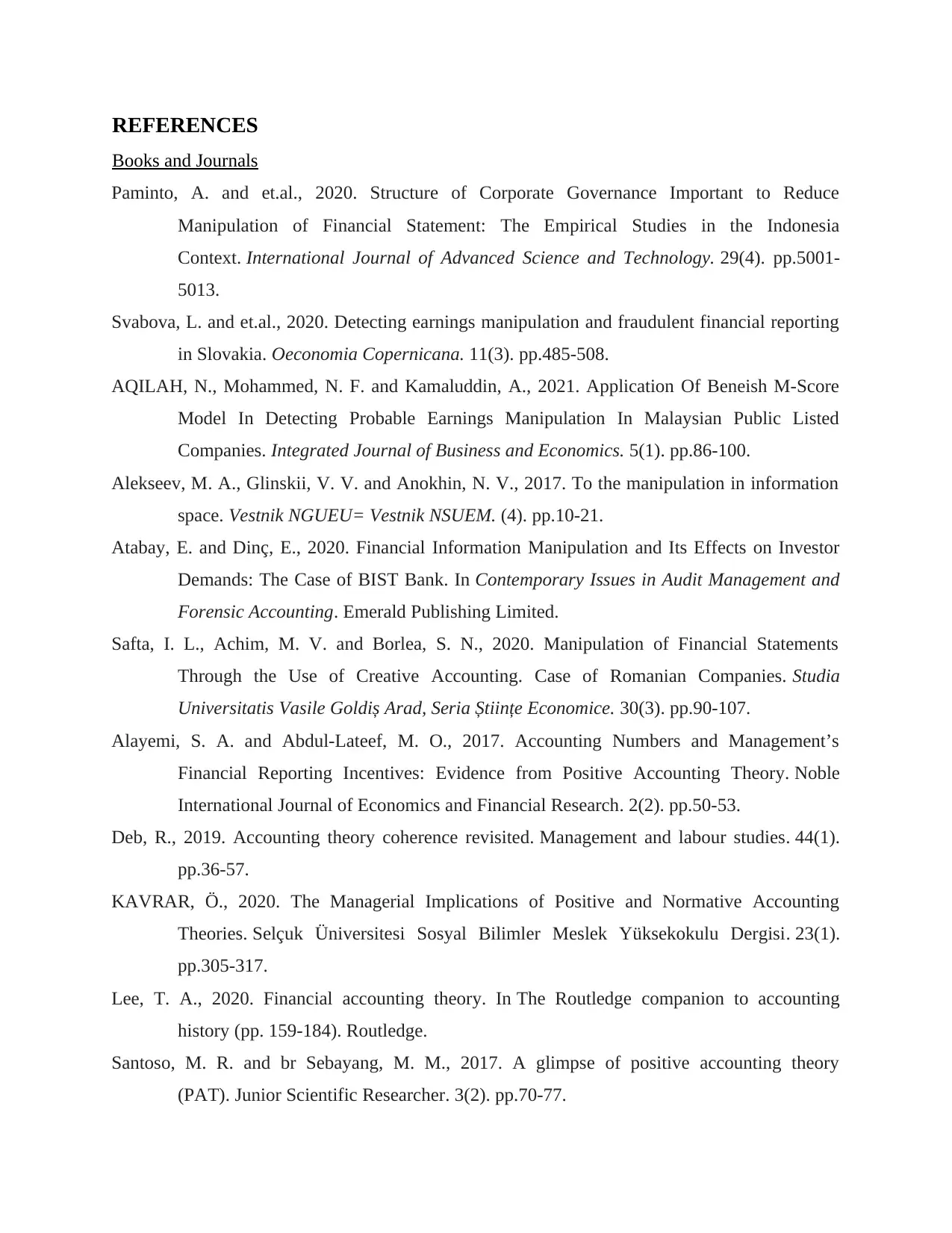
REFERENCES
Books and Journals
Paminto, A. and et.al., 2020. Structure of Corporate Governance Important to Reduce
Manipulation of Financial Statement: The Empirical Studies in the Indonesia
Context. International Journal of Advanced Science and Technology. 29(4). pp.5001-
5013.
Svabova, L. and et.al., 2020. Detecting earnings manipulation and fraudulent financial reporting
in Slovakia. Oeconomia Copernicana. 11(3). pp.485-508.
AQILAH, N., Mohammed, N. F. and Kamaluddin, A., 2021. Application Of Beneish M-Score
Model In Detecting Probable Earnings Manipulation In Malaysian Public Listed
Companies. Integrated Journal of Business and Economics. 5(1). pp.86-100.
Alekseev, M. A., Glinskii, V. V. and Anokhin, N. V., 2017. To the manipulation in information
space. Vestnik NGUEU= Vestnik NSUEM. (4). pp.10-21.
Atabay, E. and Dinç, E., 2020. Financial Information Manipulation and Its Effects on Investor
Demands: The Case of BIST Bank. In Contemporary Issues in Audit Management and
Forensic Accounting. Emerald Publishing Limited.
Safta, I. L., Achim, M. V. and Borlea, S. N., 2020. Manipulation of Financial Statements
Through the Use of Creative Accounting. Case of Romanian Companies. Studia
Universitatis Vasile Goldiș Arad, Seria Științe Economice. 30(3). pp.90-107.
Alayemi, S. A. and Abdul-Lateef, M. O., 2017. Accounting Numbers and Management’s
Financial Reporting Incentives: Evidence from Positive Accounting Theory. Noble
International Journal of Economics and Financial Research. 2(2). pp.50-53.
Deb, R., 2019. Accounting theory coherence revisited. Management and labour studies. 44(1).
pp.36-57.
KAVRAR, Ö., 2020. The Managerial Implications of Positive and Normative Accounting
Theories. Selçuk Üniversitesi Sosyal Bilimler Meslek Yüksekokulu Dergisi. 23(1).
pp.305-317.
Lee, T. A., 2020. Financial accounting theory. In The Routledge companion to accounting
history (pp. 159-184). Routledge.
Santoso, M. R. and br Sebayang, M. M., 2017. A glimpse of positive accounting theory
(PAT). Junior Scientific Researcher. 3(2). pp.70-77.
Books and Journals
Paminto, A. and et.al., 2020. Structure of Corporate Governance Important to Reduce
Manipulation of Financial Statement: The Empirical Studies in the Indonesia
Context. International Journal of Advanced Science and Technology. 29(4). pp.5001-
5013.
Svabova, L. and et.al., 2020. Detecting earnings manipulation and fraudulent financial reporting
in Slovakia. Oeconomia Copernicana. 11(3). pp.485-508.
AQILAH, N., Mohammed, N. F. and Kamaluddin, A., 2021. Application Of Beneish M-Score
Model In Detecting Probable Earnings Manipulation In Malaysian Public Listed
Companies. Integrated Journal of Business and Economics. 5(1). pp.86-100.
Alekseev, M. A., Glinskii, V. V. and Anokhin, N. V., 2017. To the manipulation in information
space. Vestnik NGUEU= Vestnik NSUEM. (4). pp.10-21.
Atabay, E. and Dinç, E., 2020. Financial Information Manipulation and Its Effects on Investor
Demands: The Case of BIST Bank. In Contemporary Issues in Audit Management and
Forensic Accounting. Emerald Publishing Limited.
Safta, I. L., Achim, M. V. and Borlea, S. N., 2020. Manipulation of Financial Statements
Through the Use of Creative Accounting. Case of Romanian Companies. Studia
Universitatis Vasile Goldiș Arad, Seria Științe Economice. 30(3). pp.90-107.
Alayemi, S. A. and Abdul-Lateef, M. O., 2017. Accounting Numbers and Management’s
Financial Reporting Incentives: Evidence from Positive Accounting Theory. Noble
International Journal of Economics and Financial Research. 2(2). pp.50-53.
Deb, R., 2019. Accounting theory coherence revisited. Management and labour studies. 44(1).
pp.36-57.
KAVRAR, Ö., 2020. The Managerial Implications of Positive and Normative Accounting
Theories. Selçuk Üniversitesi Sosyal Bilimler Meslek Yüksekokulu Dergisi. 23(1).
pp.305-317.
Lee, T. A., 2020. Financial accounting theory. In The Routledge companion to accounting
history (pp. 159-184). Routledge.
Santoso, M. R. and br Sebayang, M. M., 2017. A glimpse of positive accounting theory
(PAT). Junior Scientific Researcher. 3(2). pp.70-77.
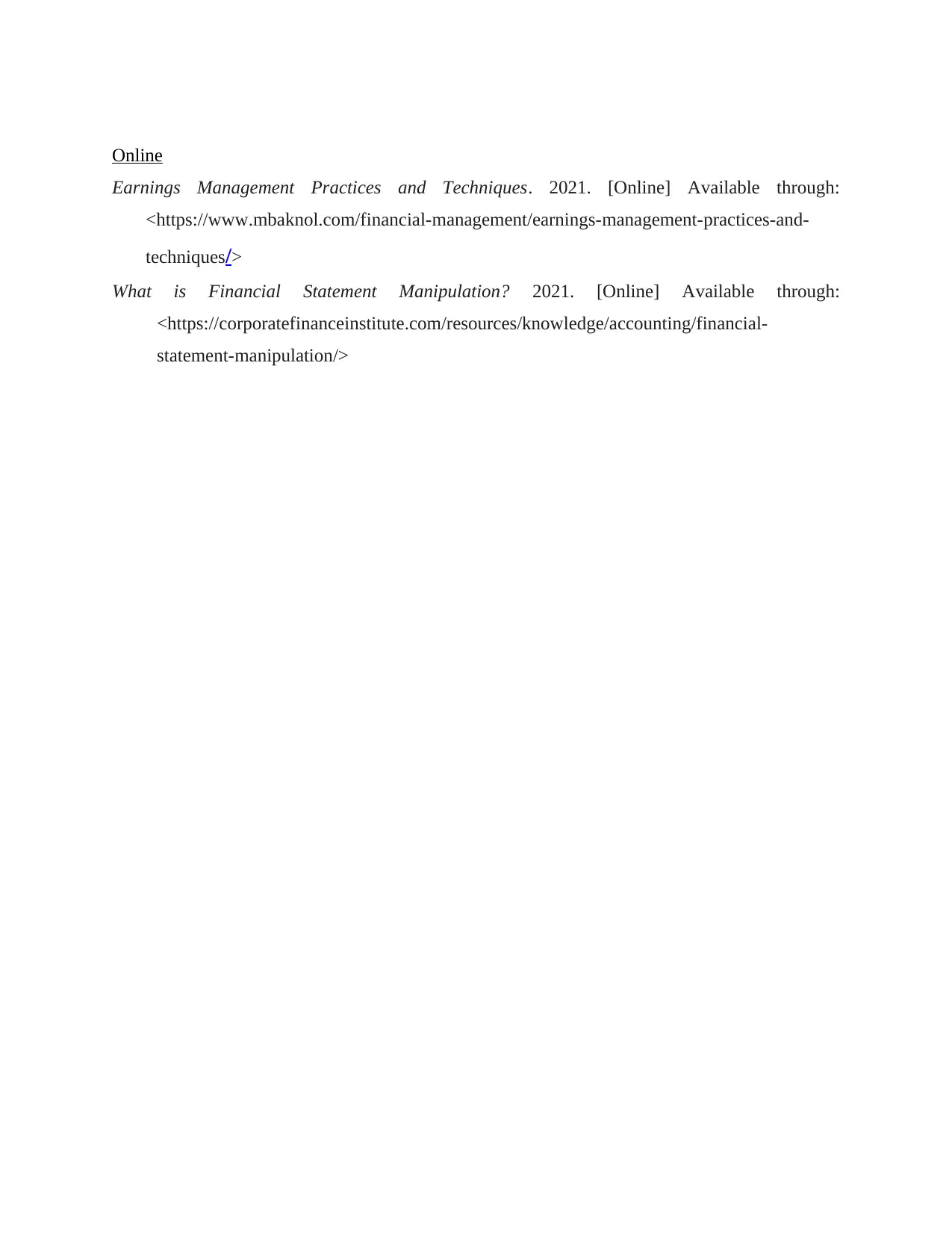
Online
Earnings Management Practices and Techniques. 2021. [Online] Available through:
<https://www.mbaknol.com/financial-management/earnings-management-practices-and-
techniques/>
What is Financial Statement Manipulation? 2021. [Online] Available through:
<https://corporatefinanceinstitute.com/resources/knowledge/accounting/financial-
statement-manipulation/>
Earnings Management Practices and Techniques. 2021. [Online] Available through:
<https://www.mbaknol.com/financial-management/earnings-management-practices-and-
techniques/>
What is Financial Statement Manipulation? 2021. [Online] Available through:
<https://corporatefinanceinstitute.com/resources/knowledge/accounting/financial-
statement-manipulation/>
⊘ This is a preview!⊘
Do you want full access?
Subscribe today to unlock all pages.

Trusted by 1+ million students worldwide
1 out of 12
Related Documents
Your All-in-One AI-Powered Toolkit for Academic Success.
+13062052269
info@desklib.com
Available 24*7 on WhatsApp / Email
![[object Object]](/_next/static/media/star-bottom.7253800d.svg)
Unlock your academic potential
Copyright © 2020–2026 A2Z Services. All Rights Reserved. Developed and managed by ZUCOL.




